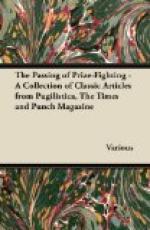“You will be sure to meet me there, to-morrow, PORTINGTON?” I observed.
“Certainly, Sir,” replied my clerk. “But, as I have to be down at the Mayor’s Court with Mr. CHARLES O’MULLIGAN in the morning, I daresay you won’t mind if I come with your sandwiches and sherry, Sir, at two, or thereabouts.”
I acquiesced, somewhat unwillingly. O’MULLIGAN shares with me the good offices of PORTINGTON, but generally contrives to secure the lion’s portion of his services. I had arranged—understanding that no adjournment was made for luncheon—that some refreshment should be conveyed to me during the day’s proceedings, so that my voice should lose none of its wonted resonance (owing to famine-produced weakness) when the time arrived for my advocacy of the cause of my clients. Those clients had, so to speak, but a collateral interest in the day’s proceedings. The great North-East Diddlesex Railway were promoting a Bill to carry a new line into the neighbourhood of the Glogsweller Extension, and my duty was confined to cross-examining one of the expert witnesses that I knew would be asked to support the G.N.E.D.R. To be candid, we had a goods depot near their suggested terminus, and were fearful that their proposed proximity would damage our mineral traffic. The matter was simple enough, but I had taken months in carefully studying a small library of charts, Encyclopaedias, and Parliamentary Blue Books, in mastering it.
On the morning following my conversation with PORTINGTON, duly robed (I had put on my wig and gown in Chambers), I travelled by hansom to Westminster, and presented myself at the side entrance to St. Stephen’s Hall. I had no difficulty in finding the Committee Room devoted to the consideration of the alleged necessities of the Great North-East Diddlesex Railway. It was a large and pleasant apartment, with a distant view through the windows of St. Thomas’s Hospital. At a horse-shoe table sat the Committee, some four or five gentlemen, who might have filled equally appropriately any one of the pews reserved in the Royal Courts for the accommodation of a Special Jury. I took my place amongst a number of my learned brethren, who were perfect strangers to me. The table in front of us was littered with plans, charts, and documents of all descriptions. A Q.C. brought with him a large bag of buns, and two cups of custard, and there were other refreshments mingled with the exhibits before us. On chairs at the side were Solicitors; at our back, separated from us by a bar, were the Public. On the walls were hanging huge charts, giving in pantomimic proportions the proposed progress of the projected line. In the corners of these charts were explanations why such a part was coloured green, or red, or blue. During the day’s proceedings an attendant was told off to trace the course of a counsel’s harangue by pointing out, with a lecturer’s wand, the various places referred to in his speech.




